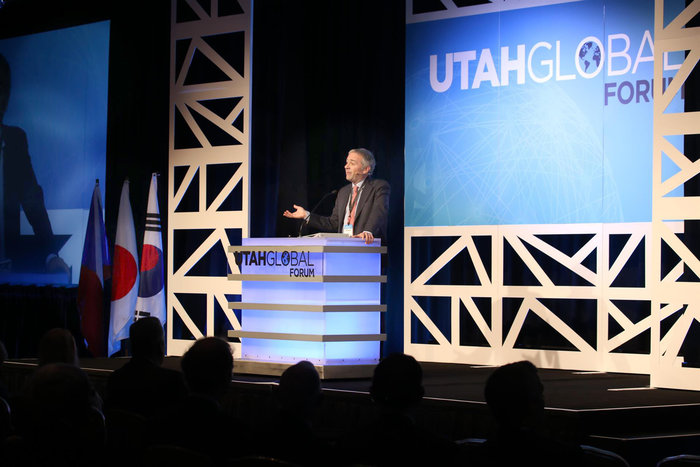Speaking at the Utah Global Forum, Edward Luce, chief U.S. columnist and commentator for the Financial Times, said businesses need to partner with community colleges to support better federal retraining legislation than currently exists to help workers affected by technology, trade agreements and other factors.
Business has a responsibility to help retrain American workers and boost the U.S. middle class, a prominent journalist told a Salt Lake City crowd last week.
Speaking at the Utah Global Forum, Edward Luce, chief U.S. columnist and commentator for the Financial Times, said businesses need to partner with community colleges to support better federal retraining legislation than currently exists to help workers affected by technology, trade agreements and other factors.
“It’s really not good quality,” Luce said of current retraining efforts. “There’s something like 47 different programs that overlap and don’t coordinate and is sort of a federal mess.
“To have business play a key role at the state level, the local level, in very visibly getting involved in retaining people who, for technology or trade or whatever reason, are finding that their skills are obsolete, I think that that could go a long way toward assuaging that very strong minority that oppose continued American global engagement. So I think business has a very, very strong, more prominent role than we’ve seen so far to play.”
An important component of that “global engagement” is the Trans-Pacific Partnership (TPP), a trade agreement among 12 Pacific Rim countries — China is not included — that is awaiting ratification. It aims to promote economic growth and trade among the nations.
While Luce said most Americans and Asian countries support TPP, “the intensity of the minority opposition” is the problem, which he said lies “in the left of the Democratic Party.” Democratic nominee Hillary Clinton supports TPP “quite strongly” but has voiced opposition in order to appease that element of the party, Luce said. If it is not ratified during the lame-duck period, “then the chances of TPP happening are very, very slim.”
But Luce held out the possibility that Clinton — Luce believes she will win — and House Speaker Paul Ryan could be able to get along and accomplish several key objectives, but only if they become pragmatic and are willing to risk the ire of members of their own parties. The objectives could include “a sort of Marshall Plan which I believe is needed for America’s middle class, a training program that’s going to upgrade this labor force and help it compete,” Luce said.
“The solutions to America’s middle-class crisis, the middle-skills crisis, that we’ve been seeing I think are really quite obvious. And I think [with] most people, there isn’t that much dispute amongst left-wing or right-wing economists – people not in politics – that you do need a retraining, you do need more in trade deals, you do need more safety nets and transition assistance for people who are in training to upgrade their skills, and you need it on a large scale — on a scale and with a competence that we haven’t seen in a long time,” Luce said.
“This is why I use the term 'Marshall Plan.' I believe if Hillary Clinton can face down the left of her party on corporate tax reform and have a lowering and a broadening, that she might have the leverage to get the bargain with Paul Ryan that would include quite significant spending levels, perhaps revenue-neutral, that would invest more in the American middle class.”
Still, Luce believes Clinton will not risk political capital during her first months in office to push TPP through “in an elitist way.” However, Japan, for example, might be willing to do “nominal side deals” to help make TPP easier to get through Congress.
The future of TPP will determine if the U.S. is still a global leader, he said. The agreement is a litmus test to the rest of the world; ratification would be seen as the U.S. reasserting its leadership, Luce said.
“I think this is of huge importance. Even though you are a very successful value-added export boom state here in Utah — and, as a landlocked state, that’s a particularly impressive accomplishment — even though you understand the benefits day-to-day in your business of access to growing Asia Pacific markets, I think that large parts of America do not.
“The reputation the United States has around the world in particular and western democracy in general has taken a severe bashing and I think you’re probably aware of what foreigners think and how closely they’re watching this [election].”
Democracy has taken a step backward worldwide and whether it is a model to be admired and emulated “is very much in question at this time,” he said.
Another challenge Clinton faces that could be affected by the TPP is the growing nuclear threat from North Korea. “She will need China’s cooperation to fix that problem. She will need Asian goodwill to fix that problem,” Luce said. “So I cannot overstate the importance of TPP, finding some way to get TPP through, to demonstrate that America is back.”
If TPP is not ratified by the U.S., participating nations might turn to China to establish alternative economic deals and economic institutions, he warned.
“I think that TPP is a very big touchstone from the eyes of the rest of the world, particularly the Asia Pacific region, of whether America is going to renew its leadership and whether America is back,” he said. “After an extraordinary election, can America come back?”
If Clinton and Ryan can work together, they could be “workhorses” who could support legislation involving the repatriation the U.S. corporate revenues at a lower tax rate, linked with an infrastructure spending bill and broader corporate tax reform, which could include lowering the corporate rate, eliminating loopholes, broadening the base and simplifying the tax, he said.
“This is the kind of ‘mini-grand’ bargain that can provide a positive demonstration effect that would probably be out of proportion to the size of the bill. It could show that Washington still works, even in what I think is going to be an even more acutely polarized Congress than the previous one,” he said.
The Utah Global Forum featured talks about exporting basics, international partnerships, global finance and the feasibility of Utah developing an inland port. Derek Miller, president and chief executive officer of the World Trade Center Utah, noted that Utah is on a path to double its exports over 10 years. Utah exports grew by 8 percent in 2015, making it the ninth-fastest-growing state for exports. Utah has a $4 billion annual international trade surplus, and 22 percent of Utah jobs are supported by international business.








